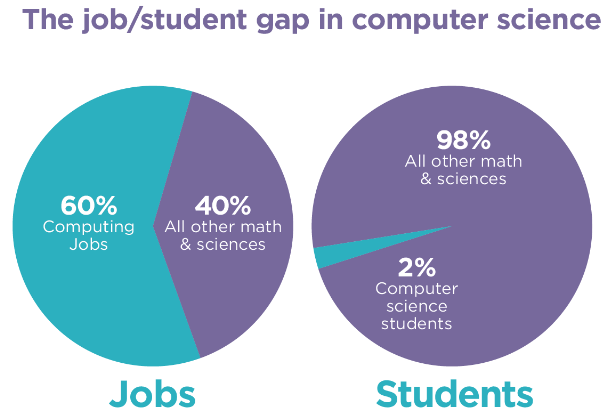Hour of Code
December 9-15, 2013 is Computer Science Education Week (CSEdWeek) and many students around the nation will be participating in code.org’s Hour of Code. This program was created to inspire K-12 students to take interest in computer science.
Why is this important?
Because 9 out of 10 elementary / junior high / high schools have zero computer sciences classes, and by 2020 it is estimated that millions of technology jobs will be left unfilled by American workers. Of course these jobs will be filled by employers choosing to outsource the work or hiring foreign employees. This is a large opportunity that the future American workforce will potentially be missing out on, if this trend continues.
The CSEdWeek website provides some great tutorials for students of all ages and programming skill levels to get started writing code. There are plenty of resources for learning, teaching, and promoting. In Illinois a citizen can sign this petition to request that computer sciences classes satisfy the high school graduation requirements for math or science. Check out code.org/stats for more jaw-dropping statistics about the lack of computer sciences classes in schools.
I went to rural schools in the far western suburbs of Chicago for all of my pre-college educational years, and fortunately for me, they offered (what I know realize to be) a great computer science curriculum:
- I learned how to type in elementary school using the PAWS in Typing Town program. This program was really fun and it included typing games like a cat catching mice and kayak racing. The faster and more accurate I typed, the faster my kayak went! While we typed, the teacher made each student in the class put a cardboard box over our keyboard so we could not see the keys. I thought all schools taught typing classes, and I was in disbelief when I learned that my 13 year old brother’s school did not offer any typing classes. I think that typing is an extremely valuable skill that every child should be mandated to learn in elementary school.
- Another class that was offered in my earlier years of school was a Logo Programming Class that taught us how to draw pictures using "programming instructions". There was a "turtle" and it drew and changed colors when the proper commands were submitted. I think the most creative thing I created in that class was a picture of an ice rink (a tribute to my love of hockey) - it was hard! If you want to give it a try, here is a Javascript Logo Interpreter.
- In middle school our teachers put on an intramural week in which they taught a class about anything they wanted. Some teachers took the easy way out and had reading or board game "classes", and one teacher even taught a class on the tricks and techniques of the yo-yo. Even though these classes were entertaining diversions from our normal class schedule, my favorite class was put on by our math teacher, Mr. Reinhardt, who taught a Q-Basic class. As you might expect, this class was not the most popular, but it taught the main programming concepts: variables, looping, and branching. The only assignment I remember was writing a program to output the first 100 numbers in a Fibonacci number sequence. I still remember the rush I got when I figured out I needed a swap variable.
- In high school, my classmates and I learned how to use Microsoft Office and could optionally take classes teaching web programming (HTML), computer assembly, and Macromedia Flash programming. The school also partnered with the local community college and I was able to take an introduction into Visual Basic for both high school and college credit.
It was not until recently that I fully understood what it takes to teach kids about computer science and more specifically programming. So here is a long overdue thank you to Mr. Thayer, Mr. Whipple, Mr. Reinhardt, and Mrs. F!
If my school had not offered any computer science classes, I would not have started my professional career working for a web development company and chances are I would not be working for Microsoft today. The bottom line is that Computer Science education is important and there are highly paid (local) jobs that are either going unfilled or overseas.
Even if a child chooses not to pursue a higher education or a job in the computer science/technology space, I think it is our responsibility to provide each child with the educational opportunity to pursue this avenue if they would like to learn more about it from an early age. Programming is becoming just as relevant (if not more relevant) in our every day lives as math, language arts, science, and social studies, and I firmly believe that we need to acknowledge this by providing it with a place in our children's school schedules.
